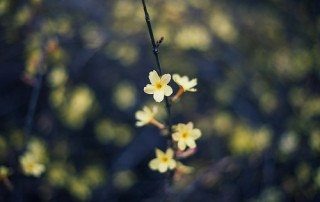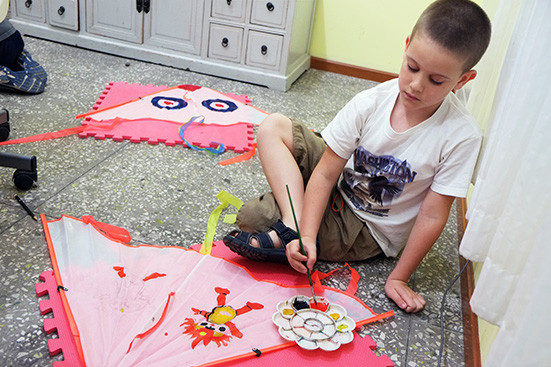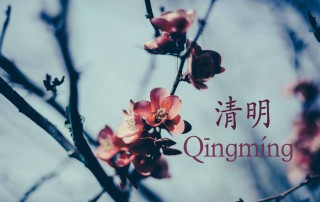清明节 - Qing Ming Jie or Tomb Sweeping Holiday
Qing Ming Jie (also called Pure Brightness Festival or Tomb-Sweeping Day), a traditional Chinese festival that remembers past ancestors, is upon us! On the 4th of April, everything will revolve around cleaning and sweeping the graves of passed loved ones and remembering ancestors, but it’s also a time for celebrating new life. Lao Guo has written an interesting article about this public holiday and how to stay healthy during this time of the year!
Qing Ming Jie
Qing Ming Jie (Tomb-sweeping Day) is an important traditional festival in China that usually takes place on April 4th or 5th of the solar calendar. During Qing Ming Jie, you can see some traditional customs like tomb sweeping, ancestor worship and picnics in nature in the vast areas of China.
Qing Ming Jie is a festival with more than 2500 years of history, and according to an old Chinese saying “植树造林,莫过清明”, Qing Ming Jie “is the best time to plant trees”. Besides the traditional tomb sweeping, other customs include physical activities like Cu Ju (an ancient Chinese Football Game), playing polo and spring outing swinging. People participate in these sports in order to follow the spring season and to keep healthy. Therefore, this festival is both for tears of sadness and laughter of happiness.
Ta Qing (踏青), “walk on the green grass”. During springtime in April, all plants turn green and it is a good time to enjoy the energy of life. And like the belief “life is a circle”, people prefer to celebrate new life while visiting deceased loved ones.
Cu Ju (蹴鞠), an ancient Chinese football game, was the most popular game in ancient China. It was invented by Huang Di, the ancestor of Chinese people, and the purpose of this game was to train soldiers.
Dang Qiuqian (荡秋千), “to swing”. This is also an old tradition which is believed by Chinese people to strenghten kids’ courage.
Fang Fengzheng (放风筝), “to fly a kite”. During Qing Ming Jie, the Chi will back up from the earth and it is a good time to fly a kite. In ancient China, people flied a kite both during daytime and night and some of them put some small lanterns on the kite and called them Holy Lights. When the kite goes too high, older people cut the line and let it go, which means the kite will take bad luck away!
Zhi Shu (植树), “plant trees”. Older Chinese people believe everything has a sprit and plant trees on Qing Ming Jie to start a new life circle for the people who passed away. In this case, Qing Ming Jie is also considered as our traditional Tree Planting Day.

清明
清明节是中国重要的传统节日,是在公历的4月5日。
由于中国广大地区有在清明之日进行祭祖、扫墓、踏青的习俗。
清明节已有二千五百多年的历史,有“植树造林,莫过清明”的农谚。
踏青、荡秋千、蹴鞠、打马球、插柳等一系列风俗体育活动。大家来参加一些体育活动以锻炼身体。因此,这个节日中既有祭扫新坟,生死离别的悲酸泪,又有踏青游玩的欢笑声,是一个富有特色的节日。
踏青
踏青,又叫探春、寻春、郊游。其含义就是脚踏青草,在郊野游玩,观赏春色。四月清明,春回大地,自然界到处呈现一派生机勃勃的景象,正是郊游的大好时光。我国民间长期保持着清明踏青的习惯。清明前后正是踏青的好时光,所以成为清明节习俗的一项重要内容。
蹴鞠
蹴鞠(cù jū),鞠是一种皮球,球皮用皮革做成,球内用毛塞紧,唐代时球内充气。蹴鞠,就是用足去踢球。这是古代清明节时人们喜爱的一种游戏。相传是黄帝发明的,最初目的是用来训练武士。至今我们叫足球。
荡秋千
荡秋千,这是我国古代清明节习俗。秋千,意即揪着皮绳而迁移。它的历史很古老,古时的秋千多用树桠枝为架,再栓上彩带做成。后来逐步发展为用两根绳索加上踏板的秋千。荡秋千不仅可以增进健康,而且可以培养勇敢精神,至今为人们特别是儿童所喜爱。
放风筝
放风筝,也是清明时节人们所喜爱的活动。每逢清明时节,人们不仅白天放,夜间也放。夜里在风筝下或风稳拉线上挂上一串串彩色的小灯笼,像闪烁的明星,被称为“神灯”。过去,有的人把风筝放上蓝天后,便剪断牵线,任凭清风把它们送往天涯海角,据说这样能除病消灾,给自己带来好运。
植树
清明到来,是时候多种些树木了。先人的精神,当像山上的树木,是长青的;人的生命,也当像新种下的树木,在这春风中成长、向上。因此清明也是我国传统的植树节。
登山
登山是个很好的有氧运动,也是一个远距离的长跑。不仅使心肺功能得到极大的锻练,还能很快地消耗脂肪,可以加强腿部的肌肉力量。
Healthy Tips for Qīng Míng Jié
Take care of the changes of the weather and adjust your clothes according to changing temperatures. Don’t show up in the public place as possible.
According to Chinese Medicine, don’t eat “fat” food, like chicken and bamboo shoots. Instead, it’s better to eat vegetables that are good for your liver and lungs, like 荠菜 (“Pickpurse”) and 菠菜 (“Spinach”).
Because Qing Ming Jie is the time when cold and warm air meeting each other, the weather changes very quickly, which causes people to easily feel humidity or paralysis of the limbs. Drinking soup with some specific herbs such as tremella, adlay, astragalus, Chinese yam, mulberry chrysanthemum or almonds will ease the symptoms.
During Qing Ming Festival, eating the seeds of plants such as oats, buckwheat, rice, lentils, coix seed, peanuts, soybeans, coffee beans, sunflower seeds is considered helpful for your health, because those plant seeds are very nutritious. Eating Qing Ming healthy porridge grains (buckwheat, oat, barley) can balance the Yin and Yang inside and enhance immunity.

清明养生
清明时节要注意天气变化,及时增减衣服,尽量少出入公共场所,尤其要注意防止“病从口入”。
清明节气中,不宜食用“发”的食品,如笋、鸡等。可多食些柔肝养肺的食品,如荠菜,益肝和中;菠菜,利五脏、通血脉;山药,健脾补肺。
清明,正是冷空气与暖空气交替相遇之际,亦日渐趋暖,所以天气一会阳光烂灿,一会儿阴雨绵绵。人体常湿困、四肢麻痹,在汤品调理中,多用利水渗湿和补益,养血舒筋的药材。如银耳、薏仁、黄芪、山药、桑椹、菊花、杏仁等。
清明要多食种子植物如燕麦、荞麦、稻米、扁豆、薏仁、花生、黄豆、咖啡豆、葵花子等。种子植物营养丰富,多食清明五谷养生粥(荞麦、燕麦,薏仁)可益肝、除烦去湿和胃、滑肠、补虚、增强抵抗力、延年益寿。
清明养生之防病
春天最美哮喘最烦。由于春季乍寒乍暖,易于受凉,另一方面春暧花开,各种花粉也诱发哮喘。
清明预防高血压。肝属木,木生火,所以在些节气中心脏会过于旺盛,是高血压的易发期。
心理疾病清明易高发。春天气压较低,加上气温变暧,代谢进人旺盛期,容易引超脑分泌的激素紊乱,从而引发心理疾病。
起床前作几个动作
春天的气候总是让人身心疲惫,昏昏欲睡。所以,我们每日早晨起床前几个简单易行的动作,不但有助于使全天精力充沛,提高工作效率,而且有益于增强身体素质,促进身心健康和延年益寿。如搓脸(干洗脸)、挺腹、拱身(猫式)等运动。
Are you interested in discovering Chinese culture and language in China? Have a look at our Internship Program or Intensive Chinese Program and start an amazing experience.
